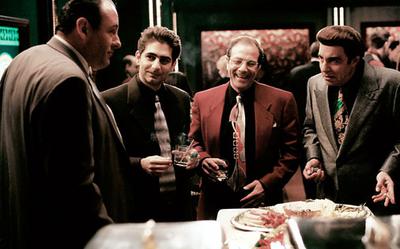Revisiting Identity Politics: What The Sopranos Gets Right
Written by Dr Sarah Marusek

This is the final post in a three-part series reflecting on questions of racism, violence and identity politics during lockdown. In this post, Dr. Sarah Marusek revisits a popular American television series to decode meanings in the contexts of ethno-racial conflict.
Identity politics has become a contentious topic in recent years. Some condemn the discourse of identity politics simply because of its potential to undermine White privilege, while others sometimes abuse the concept to unfairly silence certain people from talking about oppression. Despite wanting to celebrate anything that can undermine any form of bigotry, I still find myself running into, under, over and around identity politics almost every day, struggling with its contradictory impact on tackling structural inequalities.
The HBO series, The Sopranos, was ahead of its time in analysing American society and politics.[1] But for some fans of the series, the infamous ‘Christopher’ episode 3 of season 4 – one of many episodes written by actor Michael Imperioli – was not very good. Critic Todd VanDerWerff particularly singles it out for critique because it is ‘an episode where everybody says what they’re feeling all of the time, and that’s why it doesn’t work.’ I want to argue that this is precisely why the episode has so much to say about identity politics today.
Written in the context of the show’s negative reception by many Italian-Americans, and first airing back in 2002, the plot is deliberately silly. The Sopranos crew, egged on by Silvio Dante, go after a group of Native Americans who are protesting the Americas’ annual celebration of the ‘conquistador,’ Christopher Columbus. The Italian-Americans’ claim that ‘Columbus Day’ is merely an expression of Italian pride, while Native Americans remain traumatised by his arrival, which ushered the mass slaughter of their people, calling it instead ‘Indigenous People’s Day’. Both sides get into a melee while demonstrating for their own version of history.
Afterwards, Ralphie Cifaretto threatens the Native American protest leader, Professor Del Redclay, that if it is not called off, then he will publicly reveal the open secret that actor Iron Eyes Cody, who starred as a Native American in many older Hollywood films, was actually an Italian-American. Meanwhile, ‘showing leadership,’ Tony Soprano appeals to ex-music mogul Hesh Rabkin to make overtures to casino owner Chief Doug Smith, Tribal Chairman of the made-up ‘Mohonk Indians’ and CEO of Mohonk Enterprises, who is described as the ‘preppy guy’ for appearing too White and too rich. Meanwhile, Carmela Soprano and her fellow mafia housewives are appalled when the chosen speaker at their annual church luncheon is a female professor who denigrates the mafia for damaging the reputation of bourgeois Italian-Americans. Interestingly, there is also a cute barb against academia when the speaker claims to be concerned about ‘the sample selection criteria’ of a study that refutes her own argument.
The dialogue throughout ‘Christopher’ – is it okay for me to admit that I find it to be absolutely hilarious? The episode starts with the Sopranos crew sitting outside of Satriale's Pork Store, with Bobby Baccalieri Jr. reading from the newspaper about the intended protests. Furio Giunta confusedly asks, ‘I thought that Columbus was the hero of America?’ Ralphie responds, ‘Nah you see it’s these Indians and the Commie fucks. They want to paint Columbus as a slave trader instead of as an explorer.’ Christopher Moltisanti (played by Imperioli) interjects, ‘You got to admit they did get massacred, the Indians…’ But Silvio impatiently retorts, ‘It’s not like we didn’t give up a bunch of shit to make up for that. Land, reservations… and now they’ve got the casinos.’ Leading the heavyset Vito Spatafore to mockingly ask, ‘What the fuck did we ever get that we didn’t have to work our balls off for?’ Bobby then jokes, ‘I wouldn’t mind sitting on my ass all day smoking mushrooms and collecting government checks;’ cue group laughter.
This exchange reveals a lot about how toxic it is to mix identity politics with any pretence to meritocracy in our Western plutocracies today, especially the grossly unequal United States. As Fraser and Gordon (1997) argue, the whole concept of ‘welfare dependency’ is both gendered and racist, biases now structurally entrenched in most Western economies. Where immigration is a more recent phenomenon, it is foreign nationals stealing jobs and taxes.
Furio, however, has a different take on Columbus. He angrily explains that, ‘In Napoli, a lot of people are not so happy about Columbus, because he was from Genoa.’ Ralphie asks, ‘What’s the problem with Genoa?’ Furio answers, ‘The north of Italy always has the money and the power. They punish the south, since hundreds of years. Even today, they put up their noses at us, like we’re peasants.’ He spits at the ground, adding that, ‘I hate the north.’ This illustrates how identity politics potentially erases many of the intersectional forces that lead to oppression (see Crenshaw 1991); while an Italian identity can mean different things based on geography, class, family and/or skin colour, essentialising identities erases those differences.
The scene where Furio and Carmela are watching Montel Williams (playing himself) interview Professor Del Redclay alongside Phillip l. Donatti, an Italian-American anti-defamation advocate, is also illuminating. The Professor says forthrightly that Native Americans would not have any problem with an ‘Italian Pride’ parade, an opening that Montel strangely rebuts by claiming, ‘Western history does say Columbus discovered America.’ The Professor reminds him of the brutality of the transatlantic slave trade, but instead Montel defends the blood, sweat and tears of every American, because the country is an ‘economic miracle’. Montel and Phillip then engage in chauvinistic banter, until the latter mentions his grandparents, ‘who braved the perilous “middle passage”,’ to which Montel suddenly exclaims, ‘Whoa! The “middle passage”? That’s the term for the slave trade.’ Phillip cheekily tries to defend himself by talking about the discrimination faced by Italian-Americans, but Montel is rightly having none of it.
The problem here is that identity politics has great difficulty adjudicating both among and between different collective traumas, as it is almost always playing out in micro, rather than macro, politics. Identity politics should be a corrective to social injustices, not an ultimatum to choose either or. Another battle over victimhood plays out again later in this episode, but this time between Hesh, a New York Jew, and Reuben, a Cuban Taíno Indian, who are close friends until the latter equates the atrocities of Columbus with that of Hitler. Hesh subsequently accuses Reuben of harbouring covert Antisemitism, and the latter storms off.
Revisiting ‘Christopher’ also sheds some light on a recent controversy surrounding the American author Jeanine Cummins and the publication of her book, American Dirt. The book is about the traumatic experience of a Mexican woman and her son escaping to the Unites States as undocumented immigrants. As Vox.com reports, the novel sold to Flatiron Books at an auction for a reported seven-figure advance and before its publication, it received rapt praise from the literary likes of Stephen King, John Grisham and Sandra Cisneros. The day of the book’s publication, Oprah Winfrey announced on CBS This Morning (seated next to Cummins) that it would be her next book club pick. BBC Radio 4 even serialised the book, airing the series to a wide audience during the coronavirus lockdown. So… where is the controversy?
The problem is not necessarily that Cummins identifies as White; nor only that the book is allegedly full of stereotypes. The controversy is that this is not her story to tell; both she and her publisher are seeking to gain wealth from the exploitation of others, a fact that was clearly on display at the book’s launch, a flashy affair adorned with centre pieces made to look like a barbed wired fence for a border wall (no, this is not a joke). One fan who attended even had her fingernails painted like the book cover. Critics were right to call this ‘trauma porn’.

Copywrite @robvato: https://twitter.com/robvato/status/1223615155860312072?s=20
Later on in the 'Christopher' episode, while gambling like VIPs in Chief Smith’s casino, Tony jokingly tells his crew that he is reminded about his grandmother being part ‘Fagawi,’ and wonders if he should do something about it. When his associates demur, he exclaims: ‘No, no – it’s true. She was! They were a nomadic tribe and they’d wander around, and they’d get lost and go, “Where the fagawi?”’ Cummins now claims that her grandmother is Puerto Rican, but this intervention rings as meaningful as when Chief Smith confesses that he spent most of his life passing as White until his so-called racial awakening to his Mohonk blood later in life, because his grandmother’s mother was one quarter Mohonk. Tony then asks him coyly, ‘And all this happened when the casino bill got passed?’ Chief Smith smirks and responds, ‘Better late than never.’
But this terrible joke also has a serious side. Writing about the American Dirt controversy, Latina author Jennifer Givhan begins by explaining how her recent novel was given only two stars by a reader, based on the idea that it was cultural appropriation. She then explains in a painfully detailed account about her many family and political connections to her Mexican-American identity. She also describes how rigorously she researched the subjects of her book. At first, I wondered whether such a self-defensive position was even necessary; but, then again, Cummins’ big budget book tour was ultimately cancelled over ‘safety fears’. That may be one way to win this argument, but what about the wider battle for social justice?
The last scenes of ‘Christopher’ finish with television coverage of the two sides getting into a violent scuffle at the parade, and the pretend hippie, Janice Soprano, channelling her assumed ‘compassion and respect’ to forcefully throw Ralphie down the stairs, thus ending their relationship. Tony ends the episode by musing nostalgically to his crew about the iconic Gary Cooper, who never said what he was feeling. Cue more bickering about which group has been the most oppressed. Writing now, as a fully disclosed White American scholar, sometimes it feels like this is exactly where identity politics has left us, almost twenty years on.
Actually… to be honest, I am a native New Yorker. But not from ‘the city’; I am from upstate New York – in the Hudson Valley – although not as far north as where cousin Tony was hiding out when he got himself killed. And funnily enough, I was living on the Bowery in the Lower East Side of New York City when Steve Buscemi was filming an episode of The Sopranos in Soho. I passed by the set one day on my way to work. Just in case any of that matters...
Works cited:
Crenshaw, Kimberle. 1991. ‘Mapping the Margins: Intersectionality, Identity Politics, and Violence Against Women of Color,’ Stanford Law Review, 43 (6) July: 1241-1299.
Fraser, Nancy and Linda Gordon. 1997. ‘A Genealogy of ‘Dependency’: Tracing a Keyword of the U.S. Welfare State,’ in Fraser Justice Interruptus, New York: Routlege.
[1] Apologies for any offence caused by the shorthand ‘American’ to describe a citizen of the the United States of America.
Author
Dr Sarah Marusek
Research Fellow
